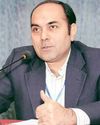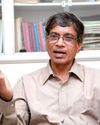The Jharkhand government has pushed through amendments to laws, leaving tribals unprotected against takeover of their land. A report from Ulihatu.

A hulking armoured vehicle of the CRPF, olive green against the dull yellow of crop stubble, stands morosely where the road curves into Ulihatu, a village of Munda tribals. such mine-proof vehicles of the CRPF are not uncommon here, in Jharkhand’s Khunti district, 55 km south of ranchi, right in the heart of the Chotanagpur plateau and still marked in deep red on maps flagging the activity of Maoist insurgents. But it’s a different protest that is gathering steam in this village these days, one that harks back to its most famous son, Birsa Munda, who led a freedom movement, or ulgulan (tumult), against the British, and later, in 1899-1900, the Munda rebellion against outsiders, or dikus, who had through economic might come to own much of the land in Chotanagpur, reducing tribals to debt and penury.
Past the tamarind and jack fruit trees, and the hens and chickens flitting from hut to hut and across the road, men are gathering in the common hall of the village, marked by an arch that says ‘The birthplace of Bhagwan Birsa Munda’ (see photo, left). Children sit watching on the boundary wall, and gun-toting CRPF commandos in fatigues strut about. From within the hall is heard the voice of men solemnly pledging to fight against the amendments to the Chotanagpur Tenancy Act (CNTA) and Santhal Pargana Tenancy Act (SPTA). These were hastily changed by the BJP government – first by an ordinance in June, and then, amendments in November – to remove the restrictions on sale of adivasi land for commercial purposes. The pledge is being read out in front of a statue of Dharti Aaba, or “father of the earth”, as the tribals have deified Birsa Munda.
Diese Geschichte stammt aus der February 16, 2017-Ausgabe von GovernanceNow.
Starten Sie Ihre 7-tägige kostenlose Testversion von Magzter GOLD, um auf Tausende kuratierte Premium-Storys sowie über 8.000 Zeitschriften und Zeitungen zuzugreifen.
Bereits Abonnent ? Anmelden
Diese Geschichte stammt aus der February 16, 2017-Ausgabe von GovernanceNow.
Starten Sie Ihre 7-tägige kostenlose Testversion von Magzter GOLD, um auf Tausende kuratierte Premium-Storys sowie über 8.000 Zeitschriften und Zeitungen zuzugreifen.
Bereits Abonnent? Anmelden

the trump phenomenon
how the 2016 election exposed the us underbelly.

chinnamma is not amma
sasikala may have become the leader of the aiadmk, but she is a far cry from j jayalalithaa, who towered over tamil nadu politics like a colossus.

sakshi malik
sakshi malik is the first indian female wrestler to bag an olympic medal. the 24-year-old comes from mokhra village of rohtak, haryana. she came into the limelight as an international wrestler after she won bronze in the junior world championship in 2010. then, she went on to win silver in the commonwealth games in 2014 and a bronze at the asian wrestling championships in 2015. after rio olympics, malik was conferred india’s highest sporting honour – the rajiv gandhi khel ratna. she is also the brand ambassador of the beti bachao, beti padhao campaign in haryana.

Across The Threshold
A social media campaign aims to bridge gaps between communities by urging people to visit ‘people unlike us’

'How Can An Insurance Firm Promote Death?'
Dr Pankaj Chaturvedi, head and neck cancer surgeon at the Tata Memorial hospital in Mumbai, is a leading antitobacco activist. He joined hands with Sumitra Hooda Pednekar and others to file a PIL in the Bombay high court earlier this year, questioning the staterun insurance firm LIC’s investments in a leading cigarette-maker company. Edited excerpts from an interview with Geetanjali Minhas:

The Wolf And The Lamb
Social injustice and the fate of the university

"Young Dalit Leaders Have Age, Situation On Their Side"
How do you see the rise of the Bhim Army in Uttar Pradesh?During the last assembly elections in UP, it was a common consensus among many [dalit leaders] that we’d give one more chance to Mayawati.

Timely Delivery
A veteran bureaucrat explains how to complete government projects without time and cost overruns.

Cauvery Water Dispute
India’s leading water expert and president of the South Asia Consortium for Inter disciplinary Water Resources Studies, S Janakarajan, wonders why Chennai, a city that receives 1,250 mm rainfall, is called a thirsty city and goes on to explain to Shivani Chaturvedi what went wrong among the southern states that led to a water-war like situation. But, he warns that such a scenario will keep occurring if the government does not come up with a lasting solution.

Case Against Cash
Can you imagine a day without cash?